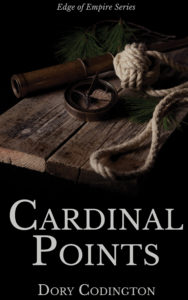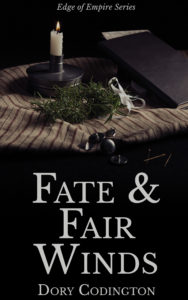Cardinal Poi nts
nts
Review from InD’tale Magazine ✮ ✮ ✮ ✮
“Born the fourth son of a Duke, Jason FitzSimmon grew up knowing he would have to find his own way in life. The sea and the freedom it held became that way. While working his way up the ladder of command, Jason realized his best opportunities lie in America, so he takes a chance, relocates to the shipping town of Boston and hires on with a local merchant shipping magnate. From the moment he enters his boss’ home, however he is mesmerized by a beautiful serving girl. Oona had been an indentured servant since she a child. After almost ten years of service, she is finally approaching freedom – if she can just abide by the strict rules set by her employers. One of them is no private indiscretions with men. But, one look at Jason and Oona recognizes his beloved face from her past. How can she stay away? Yet, if she doesn’t she risks everything she’s worked for her entire life. This story is a delicately woven mix of history and romance. Both are done with exquisite care and understanding, both are intricately woven into the soul of the reader. Because of this the historical aspect becomes a very large focus of the story so those who are not committed history buffs may get decidedly bored at times. The relationship between Oona and Jason is definitely worth the read, however! Watching a forbidden love grow as the American revolution gears up is both exciting and riveting. Although Jason’s nonsensical choices near the end leave the reader scratching their heads rather than sighing in satisfaction, this committed historical is definitely a keeper.” Ruth Lynn Ritter http://www.indtale.com/magazine/2013/december-january/#?page=72
Historical Novel Society Review:
“There is nothing so superfluous as the fourth son of a duke” – so muses young Jason, the hero of Dory Codington’s energetic and winning “Edge of Empire” series, as his family’s shipping vessel, the Chardon, pulls into Boston Harbor in 1773. Jason is a very extra son of the Duke and Duchess of Chardon who’s decided to forego academia or the clergy in favor of a mariner’s life, and that life brings him to Boston on the eve of the Boston Tea Party (marvelously described by Codington, a former guide on Boston’s Freedom Trail), in which Jason is impulsively swept up – along with a level-headed indentured servant woman named Oona, whose pragmatic soul is touched by Jason’s impetuous courage. The Boston Tea Party of course ignites the colonies in rebellion, and Codington’s story follows Jason and Oona through all those familiar events from fresh perspectives. Historical fiction this good set in the American Revolution is rare – readers shouldn’t miss it
http://historicalnovelsociety.org/reviews/cardinal-points-edge-of-empire-series
 Fate and Fair Winds
Fate and Fair Winds
Reader Lynn LeBlanc just finished Fate and Fair Winds and reviewed it on Goodreads and Facebook : Just finished “Fate and Fair Winds” by Dory Codington. Sweet and very sexy; my previous description of her first novel “Cardinal Points” applies here too – a bodice ripper in the best sense. Both are exciting historical novels to boot. Kudos!
The Historical Novel Society review of Fate and Fair Winds.
A familiar star-crossed-lovers twist informs the basic plot of Dory Codington’s historical romance Fate & Fair Winds: John FitzSimmon, a Major in the Royal Army assigned to the American colonies at the breakpoint of Revolution in 1776, is visiting his brother in Philadelphia when he comes across Rebecca Willent sketching on the bank of a river and is instantly taken with her. Rebecca has been promised by her father to a much older man in marriage, and she is furiously despairing about her fate when FitzSimmon makes his appearance. The two strangers fall in love despite their opposite political loyalties in the conflict that is heating up all around them.
Codington manages to make this familiar premise feel fresh, mainly by virtue of her vivid dialogue and her extensive period research, especially into the details of the occupation of Philadelphia in 1777-78. She also gives the ordinary details of day-to-day colonial life (the weather, the food, the roads, etc.) an appealing feel of reality. Readers familiar with the genre will know to expect many of the details of the book’s concluding chapters, but there is enough solid storytelling to keep even genre newcomers reading.
